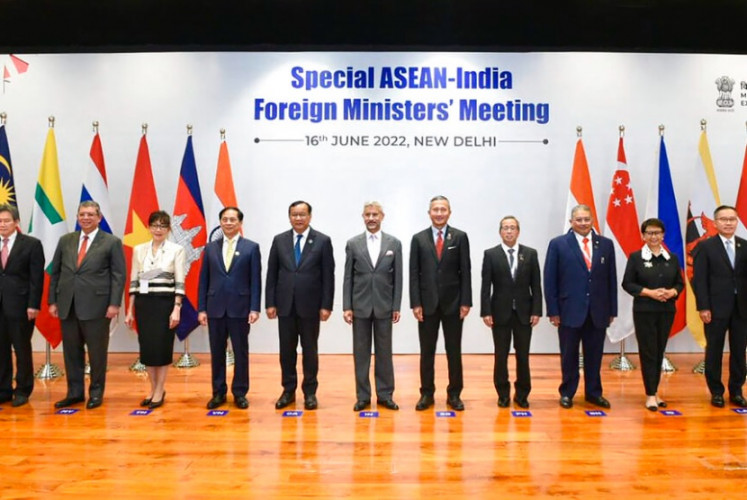Omnibus bill on job creation fails to address low worker productivity
So, how will the bill create jobs and train jobseekers, when unemployment was at 6.8 million in February 2019 and millions of others are waiting to be retrained?
Change Size
 Workers from the Confederation of Indonesian Trade Unions (KSPI) protest the controversial omnibus bill on job creation in front of the House of Representatives in Jakarta on Feb. 12. (JP/Dhoni Setiawan)
Workers from the Confederation of Indonesian Trade Unions (KSPI) protest the controversial omnibus bill on job creation in front of the House of Representatives in Jakarta on Feb. 12. (JP/Dhoni Setiawan)
W
orkers in Indonesia are like low-scoring students being ignored by their teacher, who is busy praising the smart students. Yet the low-performing ones may be those from families struggling with poverty and low nutrition.
A recent survey shows that Indonesian workers’ productivity is even lower than the ASEAN countries’ average, and the sweeping omnibus bill on job creation, despite its name, seems to do little to address related labor issues.
A survey by the Japan External Trade Organization (JETRO) reveals that the productivity of Indonesia’s manufacturing plants only scores 74.4, with the assumption that the productivity of Japanese companies is 100. Indonesia’s score is lower than that of Vietnam, the Philippines, Singapore and Thailand, which are all above 80, and ASEAN countries’ average of 78.2.
Business stakeholders have used this as “ammunition” to demand a labor regulation overhaul, citing high labor costs and rigid regulations as obstacles to businesses and investments. They seem upbeat as the government — or the teacher — submitted the bill in favor of the smart students or businesses and investors, while some of its provisions overlook workers — the low-scoring students in the class.
Among other changes, the bill states that the new regional minimum wages will be calculated using each provinces’ economic growth, yet the economies of Papua and Maluku shrank in last year’s fourth quarter. The stipulation, if implemented, would only widen Indonesia’s inequality gap.
Moreover, labor-intensive industries will be allowed to defy such calculations and have their respective governors set their own minimum wages.
The bill may retain today’s severance pay scheme, but labor rights beyond basic allowances are reduced or even scrapped completely.
It shows that the government, or the teacher, focuses on creating a good environment for smart pupils or businesspeople to thrive and raise the class’ achievements while ignoring the low-scoring students, who need help more.
The government has indeed acknowledged it was seeking a pro-business law. However, the bill does not address productivity, an issue vital to industries that need comprehensive and cross-dimensional efforts to solve.
Economists Alistair Dieppe and Gene Kindberg-Hanlon of the World Bank’s Development Prospects Group wrote on the bank’s website that a reform package combining additional investment, human capital development and new technology adoption through company-level and market reforms could lift productivity growth by about 0.6 percentage points.
Thus, beyond investment liberalization, the government should increase access to affordable and better education and training by working with businesses to ensure curriculums match industry needs. The cooperation is essential: Statistics Indonesia data show that the unemployment rate for vocational school graduates is ironically the highest among other education levels.
Efforts to end stunting and malnutrition among infants should continue as a strong, bright and productive workforce will not materialize when youngsters suffer from malnutrition.
Further, the bill also relaxes an outsourcing regulation, allowing outsourcing agencies to hire workers for various tasks, including for core functions and not only supporting ones as earlier allowed. Encouraged by more job opportunities with outsourcing, individuals may upskill and reskill themselves but will lack the formal sector’s protection.
Over 55 percent of Indonesia’s 133 million-strong workforce comprises informal workers as of August 2019, but they seem to be excluded in the bill.
Job creation should not be about reducing wages or allowances to match the quality of “low productivity” workers but to improve and upskill workers to match the requirements to achieve higher productivity.
A more secure income and job can eventually benefit the economy as workers can maintain or improve spending, which contributes to over half of the country’s economy.
Joseph Stiglitz, a Nobel laureate in economics, once wrote that “one element of growing internal demand is improving the distribution of income — when income is skewered toward the top, internal demand will be weak”.
Household spending grew by 4.97 percent in the fourth quarter, a decline from 5.08 percent in the corresponding period of 2018. Over the same period, Indonesia’s economy expanded by just 4.97 percent, the slowest since 2016.
Overall, the economy grew by 5.02 percent last year, lower than 5.17 percent in 2018, amid cooling investments and exports. During the same year, the country’s 50 richest people’s combined wealth grew around 4.3 percent to a record US$134.6 billion, about 12 percent of the country’s gross domestic product. However, Indonesia’s poverty rate only declined 1.7 percent between 2014 and 2019, the slowest in the last 40 years, data compiled by the Institute for Development of Economics and Finance (Indef) showed.
Jobseekers will be able to join training under the government’s preemployment card while the bill sets up a new security net for laid-off workers. However, the preemployment card program is expected to reach just 2 million people across the archipelago by 2021, with around Rp 10 trillion ($711.28 million) allocated for the program this year.
So, how will the bill create jobs and train jobseekers, when unemployment was at 6.8 million in February 2019 and millions of others are waiting to be retrained?
Former finance minister Chatib Basri even warned the government not to oversell the program as critics and industry players questioned its effectiveness in addressing the skills gap. “There will be glitches [...] but that’s normal if we have realistic expectations,” he said.
Transparent deliberations for the bill are urgently needed to accommodate the views of researchers and laborers in formal and informal sectors. Improving productivity ultimately needs real investment, not short cuts for the country’s human resources.







